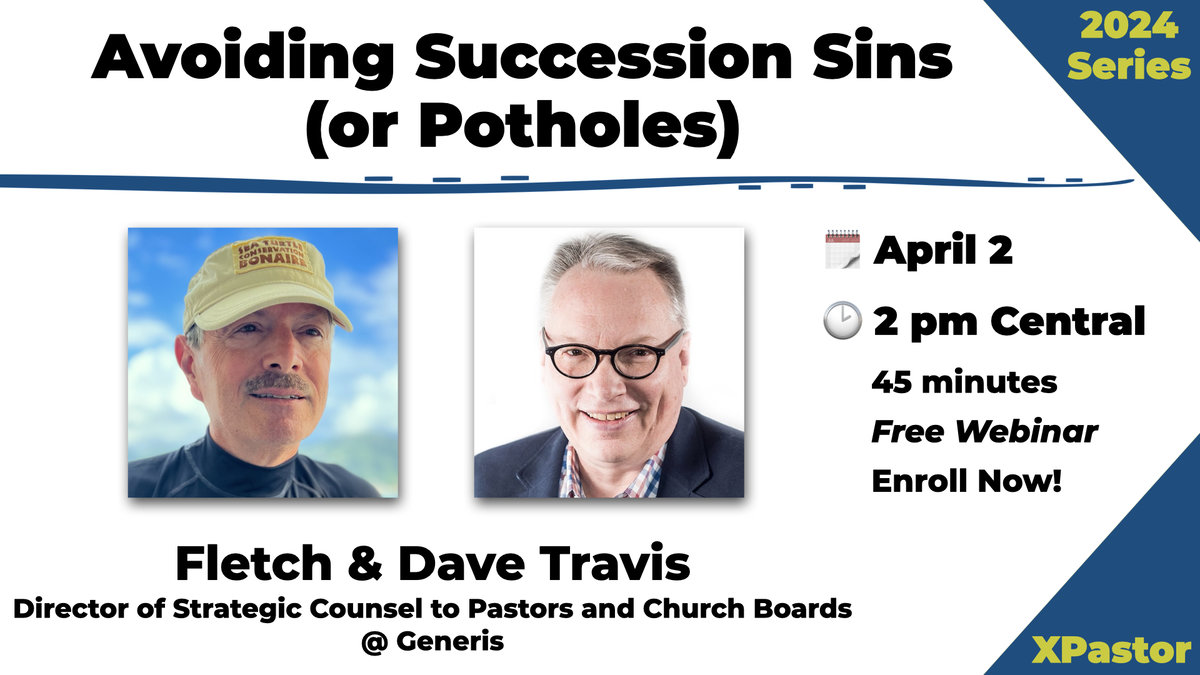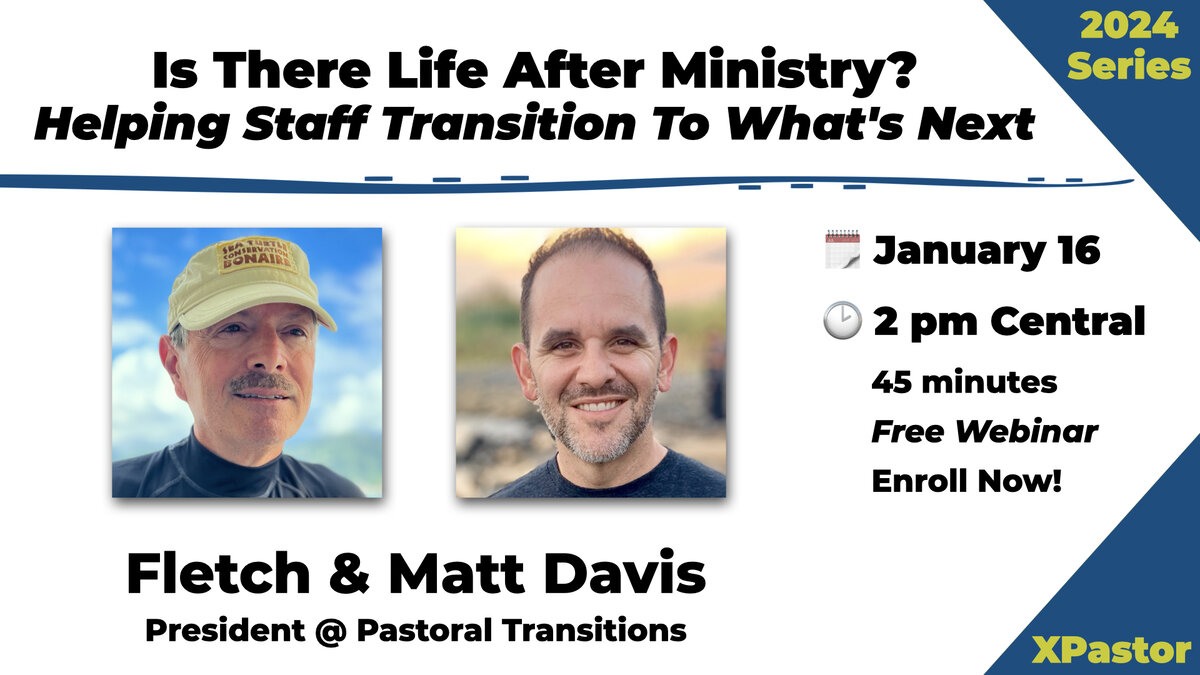I have lived through hurricanes. When I was much younger, growing up in Florida, there were several times when my family huddled together in our boarded-up home, lighting candles when the power went out and listening to the fury of the passing storm. Once the “all clear” was given, we would step outside to survey the damage done to the landscape—tree branches strewn about, water everywhere and the usual debris left behind by the battering winds.
Sometimes, the effects were more serious and long lasting; the residents of the Gulf Coast and eastern seaboard will be living with the aftermath of Hurricanes Katrina and Sandy for years to come.
The Pastoral Storm
When a pastor is exited from ministry, it can feel like they have been hit by an emotional and spiritual hurricane. Emerging from the storm, the ruined landscape of life that greets them can be overwhelming—and the impact can last long into the future. Exits occur for many reasons; regardless of why, the devastation to a pastor and his family is real.
Working on his doctoral dissertation at Covenant Seminary, Dr. Art Hunt studied the occurrence of forced exits among pastors in the Evangelical Presbyterian Church. His conclusions are insightful:
Three significant themes also surfaced: (1) the ongoing, unresolved conflict that often swirls like an unending storm around pastors who experience a forced pastoral exit; (2) the personal, multifaceted impact or ‘cost’ of such a forced exit for the pastor, his wife, his children, and his current/future ministry practice; and (3) what might best be described as the ‘post-traumatic care’ that is desperately needed but often sorely lacking after the pastor is forced to leave the church he once served. —Dr. Art Hunt (Cornerstone EPC), Doctoral Dissertation, “I Never Expected This Would Happen to Me.”
Exits affect every area of the life of a pastor and his family: physical, social, emotional and spiritual. When asked, many describe the experience with words like pain, emotional stress, and depression.
From the March 2012 issue of the Review of Religious Research, an online study found 28% of ministers said they had at one time been forced to leave their jobs due to personal attacks and criticism from a small faction of their congregations. The researchers from Texas Tech University and Virginia Tech University also found that the clergy who had been forced out were more likely to report lower levels of self-esteem and higher levels of depression, stress and physical health problems. Months of suffering traumatic and demeaning psychological and emotional abuse as they are slowly being forced out of their pulpits due to congregational conflict, Tanner said, “is a really, really horrible process.” A separate survey by Texas Tech and Virginia Tech researchers of 55 ministers who were forced out of a pastoral position found a significant link with self-reported measures of post-traumatic stress disorder and generalized anxiety disorder.
What debris is left behind after a pastor has been exited? Damage shows up most often in these three areas:
1. Mistrust
A pastoral exit means more than the loss of a job. It is also the loss of significant relationships. Those of us who lose a secular job have our church family to turn to for encouragement and support. Not so for a pastor and his family. Mistrust of the church sets in and many become ambivalent toward and distant from the church. The house has been leveled—we can’t go back and we wouldn’t want to go back even if we could. The place of healing becomes the pit of hurting and trust has been compromised.
Even more deeply felt is the damage done to a pastor’s trust in God. The loving counsel so easily dispensed to others regarding God’s faithfulness and sovereignty is difficult to recall for the exited pastor.
2. Loss of Self Esteem
The idea that exited, burned out or fallen pastors are “damaged goods” runs deep on both sides of the pew. When a pastor begins to see himself as a failure, shame hangs over every aspect of his life. It is hard to see the difference between I have failed (which we all do, and hopefully learn from) and I am a failure. It doesn’t take long until doubts about one’s call creep in, like rot at the core of the heart.
As a result, there is a growing sense of isolation for the exited pastor and his family—former colleagues move on with life and ministry while the exited pastor feels left behind.
3. Anger
No matter how stoically a pastor may try to move through the ruins of an exit, anger bubbles under the surface. This is especially true if the pastor is “blindsided” by church members or leaders when the exit occurs. “How could God’s people do this?” “How could GOD do this to me?” These questions are the seeds of anger that can eventually grow into a life filled with negativity, bitterness and frustration.
The pastor’s spouse and children can be collateral damage in the wake of the storm of an exit. They often hurt the most. They bear not only the pain and disappointment of their loved one, but are often subjected to their own wounding in the process. Add to this the pastor’s desire to protect his family, and an already significant amount of anger can easily be doubled. It is no wonder that 40% of those exited never return to ministry again. It is too hard to rebuild.
The Negative Impact on Churches
One additional piece of wreckage that is often overlooked is the impact that forced exits have on the church.
A great deal of time and effort is spent trying to clean up after the storm of an exit. The resources that might normally be expended in effective ministry and communication of the Gospel are instead spent sorting through the mess left behind. Unfortunately, many churches opt to try to gloss over the issues rather than deal with them, creating a toxicity that builds over time.
Leaders urge the congregation to ‘put this behind us and move on.’ Emotions and feelings resulting from difficult, significant, painful experiences in the life of the fellowship may be submerged for a while, but these emotions will appear in future events in the church. A suspicious attitude may become characteristic of the congregation. Percentages are high that having once terminated a minister, the congregation will repeat unhealthy methods of dealing with conflict or disagreement.—David A. Myers, D.Min. (Ministering to Ministers Foundation, 2012).
The God of Hope
The ruined landscape that appears after storms like Hurricanes Katrina and Sandy is overwhelming. Pictures take our breath away. The stories of deaths and injury, of the breadth of destruction left behind, and of the sheer magnitude of lives changed forever weigh on our hearts. Yet, alongside of these, there come evidences of hope.
Though some people just walked away, many didn’t following Hurricane Katrina. Eight years later, they are still working to reclaim the city from the brink of utter ruin.
Even as the 2013 Super Bowl was ramping up in New Orleans, the rebuilding and restoration of that city continued. I can’t think of a better metaphor for the God who can suddenly appear in the middle of the mess and bring hope, peace and restoration to the broken lives of exited pastors and their families.











